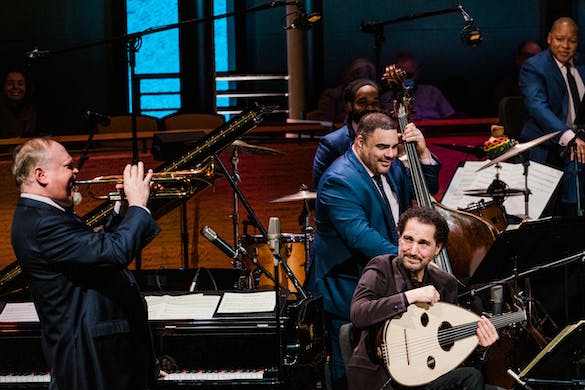East and West Meet at Jazz at Lincoln Center
As Wynton Marsalis explains it: ‘We’re trying to put things together here and figure out how to get our sounds together.’

‘Middle Eastern Meditations’
The Jazz at Lincoln Center Orchestra
Wynton Marsalis, musical director, featuring Naseer Shamma
When Jazz at Lincoln Center announced that its first big concert of 2023 was going to be titled “Middle Eastern Meditations,” longtime JALC followers had no idea what to expect. Maybe a program featuring “Caravan,” “Night in Tunisia,” “Song of India,” “Blue Rondo à la Turk,” “In a Persian Market,” and even “The Sheik of Araby?”
As it turned out, the program was so far outside of the usual jazz concert box that nobody could have predicted what we were going to hear. The use of the word “meditations” did not help: There was virtually nothing on the two-act program that was even vaguely meditative. The show was thoroughly uptempo, and, in its own intercontinental, pan-cultural way, wildly swinging.
“Middle Eastern Meditations” was a collaboration with a highly celebrated Iraqi instrumentalist and composer, Naseer Shamma, described by JALCO’s director, Wynton Marsalis, as “a virtuoso of the oud” and “a man of deep soul.” Like most Jazz at Lincoln Center Orchestra events, the idea was to take nine selections on a common theme — in this case, all compositions by Mr. Shamma — and have nine different members of the orchestra, who are also arrangers as well as players, come up with orchestrations thereof.
Even though there were nine different arrangers, all of them working in an idiom largely outside of their experience, the music itself was remarkably consistent. The first piece, “Tomorrow’s Beautiful,” arranged by saxophonist Ted Nash, set the tone. It begins with the reed section playing short, choppy, and highly rhythmic phrases on flutes and clarinets; this combination was employed several times throughout the evening at moments when the arranger wanted the section to sound overtly Eastern.
Then came an unaccompanied oud solo by Mr. Shamma, one of many of his that night that confirmed Mr. Marsalis’s appraisal of him. Mr. Shamma played with the time here, very subtly slowing down and then speeding up again, in a manner similar to the way in which drummers are often featured in a big jazz band.
As Mr. Shamma shifted back into tempo, he was joined first by the rhythm section, especially bassist Carlos Henriquez and drummer Obed Cavaire (who, to add to the international flavor, are of LatinX and Haitian descent). The woodwinds then re-entered, playing at a faster clip, now joined by the brass. When the trumpets and trombones come in, the piece sounds more like American big band jazz, and the groove very subtly shifts to something more like 4/4 swingtime.
There were then swinging solos by trombonist Chris Crenshaw over a background that got gradually larger. The piece shifted again and we heard Mr. Nash and Sherman Irby playing a conjoined duo on two soprano saxophones as the piece slowed down to a total standstill. This turns out to be a fermata, and after a few beats, the entire ensemble returned, now again playing in more of a Middle Eastern time feel. (I’m not even going to begin to try counting it.)
Most of the pieces followed that pattern, alternating between Middle Eastern and American jazz musical moments, with all sorts of gradations between. The second piece, “Oud Jazz,” was one of many composed by Mr. Shamma specifically for this evening.
The arrangement by saxophonist Sherman Irby started out with the American jazz flavor, the horns playing a distinct pattern with Mr. Shamma’s oud directly on top, giving it a sound most of us had never heard before in either hemisphere. There was a brief duo passage between Messrs. Shamma and Marsalis, before the piece settled back into jazz time, with solos by trumpeter Marcus Printup, trombonist Vincent Gardner, and then Mr. Shamma again — perhaps it shouldn’t have been a surprise that he too could improvise and solo completely comfortably in the American rhythmic idiom.
The two-hour, two-act concert had nary a weak moment. Nearly everything was uptempo and super staccato: No tranquil background music for zen meditation here. At different times, the orchestra could be heard detouring through other international destinations. Spots in Chris Crenshaw’s arrangement of “Inanna & Dumuzi” were suggestive of the Cuban clave and others sounded more like Flamenco sketches and Spanish pasodobles, while Dan Nimmer’s piano feature on Victor Goines’s treatment of “Carthage” put me in mind of Lennie Tristano playing “Turkish Mambo.”
The climactic piece was the full-on collaboration between Messrs. Shamma and Marsalis that we were waiting for, composed by the first and orchestrated by the second. Mr. Shamma titled it “With Wynton,” but Mr. Marsalis, who compares Mr. Shamma to such jazz masters as Art Blakey and Dizzy Gillespie, said, “I want to call it, ‘With Naseer.’”
This was the most fully realized combination of East and West, the two sounds not exactly merged but played for contrast against each other. The chart starts with five sopranos — at which point snakes were leaping out of baskets all over Columbus Circle — then four open-belled trumpets and next an episode of muted brass, followed by flutes and clarinets with Mr. Shamma. The centerpiece is, as we were hoping, a playful “chase chorus” and duel between trumpet and oud.
Early on, Mr. Marsalis explained his mission statement for the evening as “a journey through the dialogue, and emergence of a new language. We’re trying to put things together here and figure out how to get our sounds together.” He speculated that, “over 40 or 50 years, something will happen, people will say, ‘Let’s take a look at what they did,’ and they’ll be a little further along in coming together.” If you ask me, they did a pretty good job of it.

